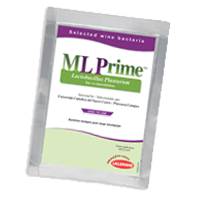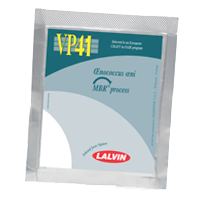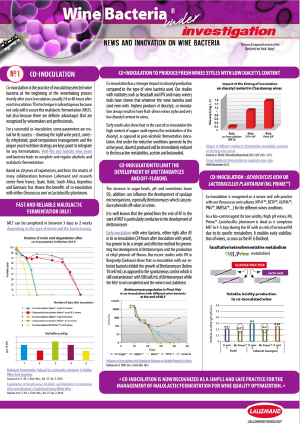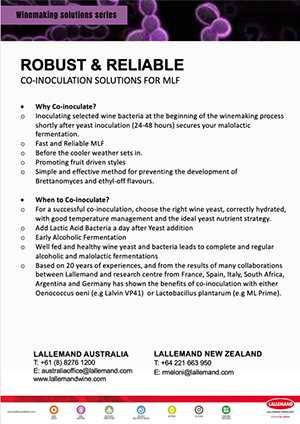Uncategorized | Reading Time 3 minutes
Co-Inoculation Solutions for MLF
Robust & Reliable
Why Co-inoculate?
- Inoculating selected wine bacteria at the beginning of the winemaking process shortly after yeast inoculation (24-48 hours) secures your malolactic fermentation.
- Fast and Reliable MLF.
- Before the cooler weather sets in.
- Promoting fruit driven styles.
- Simple and effective method for preventing the development of Brettanomyces and ethyl-off flavours.
When to Co-inoculate?
- For a successful co-inoculation, choose the right wine yeast, correctly hydrated, with good temperature management and the ideal yeast nutrient strategy.
- Add Lactic Acid Bacteria a day after Yeast addition.
- Early Alcoholic Fermentation.
- Well fed and healthy wine yeast and bacteria leads to complete and regular alcoholic and malolactic fermentations.
- Based on 20 years of experiences, and from the results of many collaborations between Lallemand and research centre from France, Spain, Italy, South Africa, Argentina and Germany has shown the benefits of co-inoculation with either Oenococcus oeni (eg Lalvin VP41®) or Lactobacillus plantarum (eg ML Prime™).
Products for Co-Inoculation
ML Prime™
MICROBIAL AND OENOLOGICAL PROPERTIES
To be used only as co-inoculation (on grapes 24 hours after yeast addition), suitable for red wine.
- pH ≥ 3.4
- Malic acid content ≤ 3 g/L
- Temperature range tolerance: from 20°C to 26°C
- Total SO2 tolerance: 5 g/hL (total addition at crush before addition of ML Prime™)
- Short lag phase – fast MLF kinetic
- No volatile acidity production: does not produce acetic acid from glucose and fructose (facultative heterofermentative strain)
- No production of biogenic amines
- Bacteria cinnamyl esterase negative: cannot produce precursors for ethylphenol production by Brettanomyces
- No diacetyl formation
- Good impact on the colour intensity of wine

Lalvin VP41®
MICROBIAL AND OENOLOGICAL PROPERTIES
Suitable for red and white wine.
- pH tolerance > 3.1
- Alcohol tolerance: up to 16 % vol.
- SO2 tolerance: up to 60 mg/L total SO2
- T° tolerance > 16°C
- Low nutrition demand
- Good implantation
- MLF Kinetic: Fast
- Low volatile acidity production
- Bacteria cinnamyl esterase negative: cannot produce precursors for ethylphenol production by Brettanomyces
- No production of biogenic amines
- Co-inoculation recommended

Further information for Co-Inoculation
Published Mar 1, 2021

